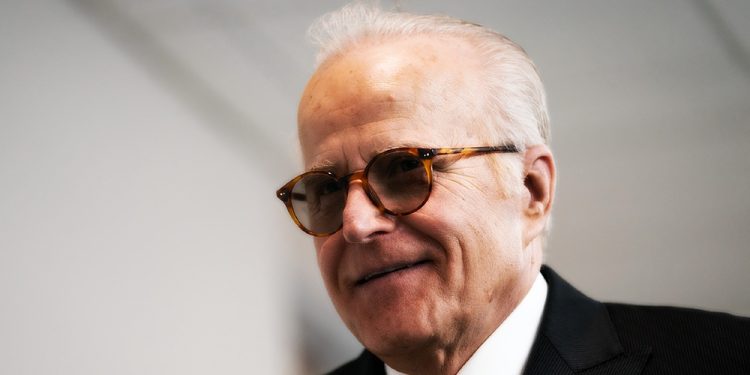(Daily Signal)—James Biden told congressional investigators that his older brother, President Joe Biden, made loans to him of $200,000 and $40,000 without charging interest, but that he has no documentation of the transactions.
“There weren’t any,” the president’s younger brother testified, according to a just-released transcript of his Feb. 21 deposition.
Jim Biden said he needed the money for “outstanding bills that I had.”
When asked whether Joe Biden was present for meetings with Tony Bobulinski, then a business associate of his son Hunter Biden, the president’s brother answered: “That I know did not happen.”
Jim Biden also testified that the contents of reported emails didn’t change his testimony or memory about his work with a collapsed rural hospital company, Americore Holdings.
The House Oversight and Accountability Committee on Friday released the 244-page transcript of the closed-door deposition, which is part of the impeachment inquiry into potential influence peddling by the president and his family.
The president’s brother became a key witness in the House probe after he and his wife Sara wrote a $200,000 check to Joe Biden on March 1, 2018, noting that the purpose was a “loan repayment.”
That $200,000 check was cut the same day that James Biden got a $200,000 payment from Americore Holdings.
Separately, the House committee released a copy of a $40,000 check written Sept. 3, 2017, from Jim and Sara Biden to Joe Biden that evidence shows may have been laundered through a Chinese energy company, CEFC China Energy, that Hunter Biden was involved in.
Several House members sat in on Jim Biden’s deposition, and several questioned him directly. At one point, Biden’s lawyer Paul Fishman said, “Calm down,” according to the transcript.
It isn’t clear whether the remark was directed at Fishman’s client or someone else.
“Have you ever made direct payments to your brother, Joe Biden?” Rep. Matt Gaetz, R-Fla., asked the president’s brother.
“I repaid two loans that I secured from my brother,” Jim Biden replied.
Gaetz followed up by asking: “And were any documents memorialized in terms of those loans?”
Biden, 75, seemed to stumble for words in answering the question.
“Through—through,” Biden said, according to the transcript. “Actual, no, no.”
Biden testified that the two checks—although made out to Joe Biden—actually went to lawyer Mel Monzack, who oversees the president’s business income such as book royalties.
“What was the full sum of those loans?” Gaetz asked.
“One was for $200,000 and one was for $40,000,” Biden answered.
Gaetz asked: “And what was the interest rate on those loans?”
Biden responded: “There weren’t any. … Yeah. Family. Uh-huh.”
Gaetz asked why he needed the $240,000 to begin with.
“Outstanding bills that I had,” Biden answered.
A House staff investigator asked the president’s brother about a recent Politico story about Americore Holdings. The investigator read from the article during the questions.
“Did you ever speak with anybody at Americore about Joe Biden getting equity in the company?” the investigator asked.
“That is ridiculous on its face. No,” Biden answered.
The Daily Signal first reported that Kentucky Attorney General Russell Coleman is investigating Americore Holdings, which operated in Kentucky.
The staff investigator continued, reading several references to the emails in Politico’s reporting.
The investigator began to ask: “This appears to be an email. Do you recall referencing—”
Jim Biden cut him off, saying, “No.”
“Joe Biden?”
“No.”
The investigator asked: “Does this—quoting an email—does this change any of your other answers about never involving—?”
Again cutting him off, Biden said: “No.”
He later denied that Joe Biden ever met with Bobulinski, his son’s business partner at the time. Bobulinski already had told the House committee that he met with Joe, Hunter, and Jim Biden in California.
“Was Mr. Bobulinski what you would consider a business associate of you and Hunter Biden?” a House investigator asked.
“He wasn’t of mine,” Biden answered. “I had discussions with him, but there was never anything that was memorialized in terms of his involvement.”
The investigator asked: “Do you recall whether you were at the bar with Hunter Biden, Tony Bobulinski, and Joe Biden?”
Biden replied: “That I know did not happen. … I could have been there just with Tony Bobulinski. I could have been there with Hunter as well. But my brother was never there.”






Not necessarily relating to this story but in general, am I the only person that thinks we only get the headline and a piece of skin in news stories and reports nowadays? Journalists never ask the questions that beg to be asked. For instance, I read a report today that told that syphilis is taking off like a wildfire but did the writer approach the reason? NO. Remember the floating balloon that crossed the length of the U.S.? Did we ever get any of the real details from our governments examination of it? Only that it spied on us. What information did it get? How did it communicate with China? Did it identify likely places to nuke? Half-axxed reporting at its best. The news media must be dumbed down to single digit IQ’s and we can forget any honesty from our government … FBI, CIA, NSA, politicians, election boards. As one of my buddies says, ” ‘ makes you proud to be an American, don’t it?”